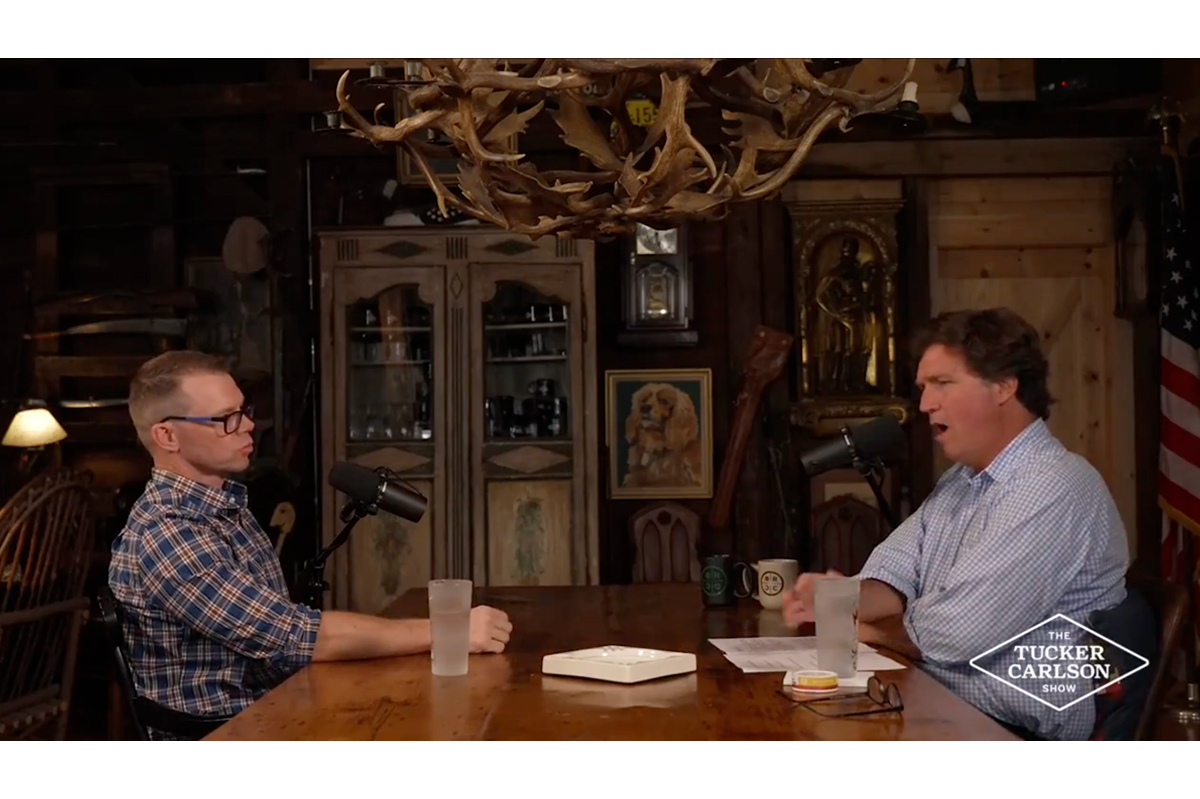


Tucker Carlson is just asking questions. Questions like: what if Andrew Tate’s camgirl harem is actually the height of masculinity? And: isn’t the Russian grocery equivalent of Aldi absolutely incredible, just as the Moscow train station is perhaps the most beautiful thing mankind has created? And this week: why don’t we fully appreciate the total bind Adolf Hitler was in when he had just so many prisoners of war thanks to German success on the battlefield?
The decisions Carlson has made in the past several months have struck his former friends and ideological allies as veering in the space between the eccentric and the outrageous. But his most recent foray into the undiscovered country of whackadoo revisionism has broken off even some of his last cadre of conservative defenders, who maintained despite all the signals that this man, once the most influential media figure on the right, was still a good, brave, stable Christian conservative with the best interests of America at heart.
Sometimes it is extremely disappointing to have your worst instincts about a person rewarded, and that is the case for many on the right today. Carlson’s interview with Darryl Cooper, an amateur revisionist historian and podcaster, attempted to rewrite the history of World War Two with Winston Churchill cast as a malevolent villain and Adolf Hitler as a misunderstood man of peace:
You know, Germany, look, they put themselves into a position in Adolf Hitler’s chiefly responsible for this, but his whole regime is responsible for it, that when they went into the east in 1941, they launched a war where they were completely unprepared to deal with the millions and millions of prisoners of war, of local political prisoners, and so forth that they were going to have to handle. They went in with no plan for that and they just threw these people into camps. And millions of people ended up dead there. You know, you have, you have like letters as early as July, August 1941 from commandants of these makeshift camps that they’re setting up for these millions of people who were surrendering or people they’re rounding up and they’re… so it’s two months after, a month or two after Barbarossa was launched, and they’re writing back to the high command in Berlin saying, “We can’t feed these people, we don’t have the food to feed these people.” And one of them actually says, “Rather than wait for them all to slowly starve this winter, wouldn’t it be more humane to just finish them off quickly now?”
The conclusion is a framed as a destruction of moral mythology, in service of the same view that Carlson has been advocating for deliberately and loudly ever since his career in mainstream media was cut short: that America, rather than being the greatest nation in the history of the world, is at home and abroad a force for evil.
There are numerous problems with this conclusion, beginning with actual facts. But the more interesting aspect is why so many confused conservatives are all asking the same question: why? Why is Tucker doing this? Why has he gone from skirting the edge of acceptable discourse in a wisecracking jester act to jumping over the edge handcuffed to Candace Owens?
Carlson’s motivations are unknown to those outside his circle. From the outside, though, it has all the hallmarks of someone who glories in offending those he dislikes, but is unwilling to do the work to even understand what they believe. If you want to argue the alternate history of the Civil War, you don’t just start by understanding John C. Calhoun, you start by understanding Abraham Lincoln. The version of history Carlson chose to host and promote about World War Two is as deep as a 4chan thread and just as insightful. It is based on the aim of deceit, but with the arrogance of someone who absorbs history by osmosis. Why read a book? A podcast summary works just fine.
The American right has had a very rough go of it when it comes to promoting media careers. The combined forces of tens of millions of dollars spent on scholarships, fellowships, book projects, media training and public relations invested in a host of writers, commentators and publications has mostly turned up naught. Carlson is now just another example of a wasted talent who betrayed everyone who built him up along the way.
Jeffrey Goldberg’s claim about Donald Trump was that he called the soldiers buried in Aisne-Marne “suckers” and “losers”. Today’s version of Tucker Carlson is just asking the question: but what if they were?
